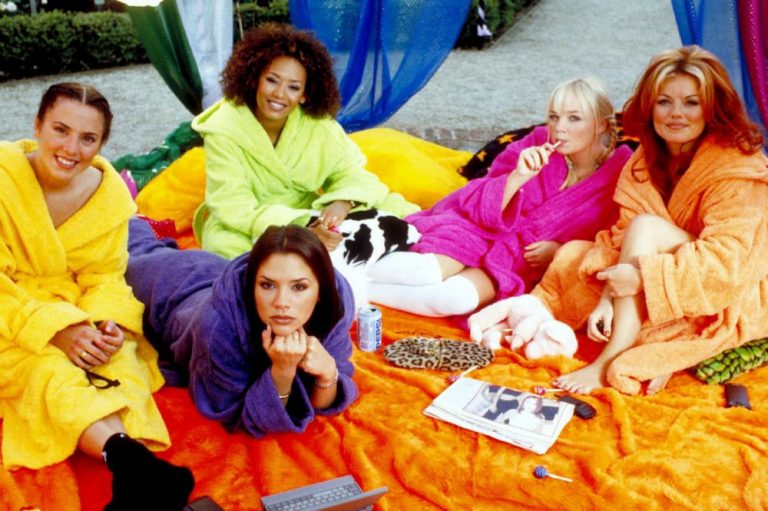God bless the Spice Girls. Like so many pop acts before them, the gang were a cluster of archetypal personalities combined in a pop music laboratory, thrown together to provide competition to their male counterparts New Kids On The Block and Take That at the height of Cool Britannia, the era in which youth culture ruled in a veritable second coming of the ’60s.
For the four years before their key lineup disintegrated, the Spice Girls made album sales records that remain unbroken, all the while conducting one of the most successful merchandising efforts ever. By May 1998, their earnings were estimated to be anywhere up to $800 million, scored off everything from dolls to pencils and books (this writer is the proud owner of some of those items).
All told, 1997 was the year of Sporty, Scary, Ginger, Baby, and Posh. Their breakthrough single ‘Wannabe’ had been released the year before and became an instant hit, saturating radio channels and becoming the highest-selling single by an all-female group of all time. Not too long after that, the band locked in three of the top five songs of 1996 in the UK, with a ten times Platinum album, Spice, picking them up extra plaudits along the way.
So by 1997, they were in their element. The year kicked off with the group storming America, Spice rapidly becoming the highest selling record of the year there, and its follow-up, Spiceworld, winning the five-piece even more fans. And at the height of all that glitz, glamour and success, they dropped the peak cultural document of that time – a key to pop mania that has not been replicated since called Spice World: The Movie.
The film is almost vindictively odd.
Spice World is quite openly modelled off A Hard Day’s Night. That film, which depicts little more than several days in the life of The Beatles, is a halfway point between Elvis Presley teen pics and the French New Wave. Indeed, the plot of Spice World, at some point presumably composed on a series of napkins or sheets of paper, is concerned with the same hysteria and intimacy that defines Hard Day’s Night. Opening with the Spice Girls as mega stars, harangued by screaming fans waiting at the back door outside the Top of the Pops studio, the film quickly reveals them to be just a regular group of girls contending with fame in the week leading up to their first show at the Royal Albert Hall.
Love Music?
Get your daily dose of metal, rock, indie, pop, and everything else in between.
The film is almost vindictively odd. There are scenes of unguarded absurdity, from a sequence in which a diabolical editor played by Barry Humphries gets soaked in an indoor thunderstorm, to a setpiece imagining the group as harried mothers, to a six o’clock news-led overreaction to Geri’s tongue-in-cheek, “is the Pope a Catholic?” line.
Much like Hard Day’s Night, the film is a playful semi-documentary, stuffed full of farce and cartoonish but still recognisably human personalities. And yet what truly hits home – aside from the film’s ability to tie up a staggering number of increasingly illogical plot threads – is the sheer scale of the spectacle. Spice World is bursting with cameos, and features everyone from Elvis Costello (the butt of a joke about fame being fickle), to Elton John, Bob Geldof, Jennifer Saunders, and even Meat Loaf, who delivers the immortal line, “I’ll do anything for those girls, but I won’t do that”.
The film is a playful semi-documentary, stuffed full of farce and cartoonish but still recognisably human personalities
In the world of the film, love for the Spice Girls knows no bounds – everyone’s a fan, from grizzled police officers, to nurses, to the young and the old. Even extraterrestrials get in the game, proving desperate for a piece of the excitement. “Are you part of the Spice phenomenon?” an unnamed man asks at a party.
Watching the film now is a nostalgic experience, of course. To say the ’90s were a better decade is naive – there was as much war, suffering, and injustice as there is presently – but it’s true that we used to know how to do a pop culture obsession better. After all, neoliberal UK Prime Minister Tony Blair once declared without a hint of irony that ‘Say You’ll Be There’ was one of his favourite songs of 1996, and Nelson Mandela once memorably announced to the world that the Spice Girls “are my heroes”. Can you imagine David Cameron or some other political luminary singing similar praises of Little Mix or One Direction?
No. There was something special about the Spice Girls – something that Spice World captures perfectly. The film not only shows Spicemania at its most dizzying high – the band wrapped up in their most lightning-in-a-bottle moment – but it’s also full of the kind of unashamed excitement that youth culture has been somewhat lacking ever since. We have just grown too damn cynical; too convinced that art has to be serious, and grating, and monochromatic, and difficult. Some are even doubting the power of pop music altogether: “Does pop culture tell anyone anything? Or are we just sticking our fingers in our ears and whistling?” the NPR blog Monkey See asked back in 2013, one moaning voice amongst many.
Certainly, Spice World marked the end of an era. The full lineup of the group never released another record: their third and final album, dropped in 2000, only featured four of the Fab Five. It would never be 1997, the year in which Prime Ministers declared their unashamed love for pop groups, again. But, mercifully, we’ll always have Spice World. Viva Forever.


































